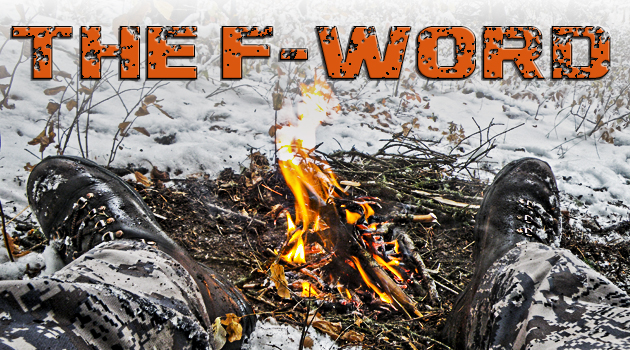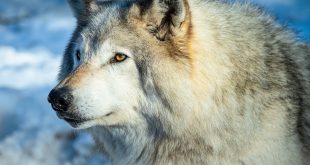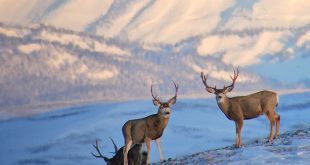Guest Author: Tim Hoffer
Adjusting the straps of my overloaded backpack for the hundredth time, I realized too late that I had too much gear, too many layers on and not enough sense to follow the lead of my two climbing partners, now 50 yards ahead of me breaking trail through shin-deep snow like a pair of mountain goats. I slogged on behind, feeling more like an anchor than a solid third teammate. I was not prepared, far from it.
Comparing two passions of mine – alpine climbing and backcountry hunting, the similarities between the two when it comes to failures and setbacks are many.
Flashing back to the full-day ice climb, I can now analyze where I went off course.
First, I was in decent shape and had climbed a fair bit that season. That gave me false confidence as I lacked true mountain fitness, the kind needed to cover moderately tricky terrain swiftly.
I needed more lung-power and leg muscles like pistons; the two guys out in front had these in spades. Second, I didn’t seek out enough sage advice and wisdom from my older, wiser and more skilled climbing partners. I focused too much on the climbing, not everything it takes to get there quickly and successfully. Twenty minutes of Q&A with Pete and Tom would have made our lives much easier.
The changeovers at belays from one leader to the next and working hard on tough pitches took their toll on me. I tried to climb faster, fatiguing myself too quickly. I overheated in my attempt to make up time and prove I knew what I was doing.
We finished the climb, and as I pulled myself over the last bit of the top pitch, I watched as Pete and Tom gave me the thumbs up while looking pretty dang relaxed and fresh. I mustered a weak wave of my ice tool and trudged through the snow to the top to meet them. All we had left were a handful of 60-meter rappels and we would be on flat ground.
The collective delays of the day made for a long, dark hike out. I arrived at the trailhead very glad to be done with the day and grateful for the patience and guidance of my climbing partners. I was also very aware that I had work to do if I wanted to succeed in the mountains, whether with ice tools or a bow in hand. I was reminded of Henry Ford’s quote, “The only real mistake is the one from which we learn nothing.” That climb was nearly 20 years ago but failure remains a fine teacher.
As I got a bit older and the responsibilities of life became larger priorities than taking off on climbing trips whenever I wanted, I narrowed my focus and switched gears to backcountry hunting. Many of the tactics, mindsets and time spent in very remote places from my climbing days made the transition fairly straightforward. But, like anything, there is always much to learn.
I recall trips into the mountains chasing elk weighed down with far too much gear and wearing those new boots in on the long approach because I was pretty sure they were broken in enough. Or, at the opposite end, going in too light and spending cold nights huddled in my bivy sack, wearing everything I brought as sleet pelted down loudly on the fabric inches from my face. Should have heeded the forecast on that one.
What I like best about learning from mistakes is each time you venture out you hone your skills and abilities while adding experience to your pocket. Sometimes you learn by watching what not to do, or hearing about a blunder of someone’s that led to a close call, or worse. It makes you pay attention and keep adding tips and tactics to your hunting toolbox.
Below are four “failures” that I can sheepishly claim to have done at one time or another and that I know others have done as well. This list is by no means exhaustive but will hopefully get you thinking about when something went sideways on a backcountry hunt and where you went wrong.
Four Failures to Learn From and Improve Your Hunting Success
- FAILURE TO BLOCK OUT ENOUGH TIME FOR THE HUNT
Few of us can tell the boss or family that we are taking August through October off, but it is essential that you realistically assess the amount of time you will need on the hunt to give yourself the best odds of coming home with a notched tag and a full freezer.
Avoid the mistake of giving yourself just enough time for everything to go exactly as planned. Build in a buffer of a day or two. Be flexible when you will start your hunt; sometimes waiting out an approaching storm by one or two days can put you in the mountains with clear skies and calm days instead of finding yourself tent-bound, riding out nasty weather and burning your limited time in the woods.
- FAILURE TO PREPARE WITH THE RIGHT GEAR AND PHYSICAL CONDITIONING
I might argue that these two points are the principal blunders that end hunts faster than anything, with the exception of major injury or extremely bad weather.
Personally, I am a bit of a packing and organizing geek, complete with spreadsheets for weights. I lay everything out on a tarp in the garage days before the hunt. I visually examine everything I need to keep hunting – stove, boots, check the pack straps, pitch the tent and check poles and zippers, clean my optics, replace the batteries in the rangefinder and GPS, sharpen my knife and go over every inch of my bow or rifle.
Know your gear, take care of it and don’t introduce new things on a hunt – not your boots, not a pack, not new freeze dried foods – test drive anything new in your kit BEFORE you take one step out the door.
Fitness. This is a big one. Starting months ahead of prime hunting season gives you ample time to gradually build a solid base level of fitness and overall endurance. For me, I know that if I am trail running and mixing in hiking with a pack on steep trails and lifting to build leg, core and back strength in May, I will be ready to tackle big mountains, heavy packs and long days in the wilderness. Seek out other like-minded souls who train regularly and focus your training on the type of hunting you do. At the end of the day, reliable endurance in the mountains will win out over being able to deadlift half an elk. Put together a plan that fits your schedule and keep it simple.
- FAILURE TO FIND GREAT HUNTING PARTNERS AND BE ONE YOURSELF
Lousy hunting partners will sink your hunt. Period. Those of us who hunt and have hunted for a decent number of years have probably headed out with guys who appear at the range or over a beer to be competent, solid hunters who would be an asset on a big hunt. They shoot well, seem to have their gear dialed, are fit enough and game to get out there and put forth some serious effort. Then you get in the mountains and after the third mile in during a rainstorm or after two solid days of seeing exactly zero game, they began to unravel.
They can’t shake the negative mood. Their effort to crawl out of their warm sleeping bag at 3 a.m. goes out the door and they talk about bailing early – signs you have partnered up with someone who will take you down, not up, when the going gets tough. It’s a two-way street – each component of the hunting party needs to chip in when required, see where help is wanted, chase the small victories and work through disappointment.
A solid hunting partner contains equal parts grit, skill, humor and determination, as well as a good dose of realistic expectations.
My current team consists of only three or four solid friends whom I am grateful to have on any hunt, anywhere, under all conditions. We have shared in fantastic successes together, sometimes them more excited than me over my own filled tag. Or, a guy always has the right thing to say after the fourth day of rain or after a big miss on an animal or hiking out with our tags intact. My goal is to ensure I am being the same to them: dependable, willing to dig in, and willing to laugh when that is sometimes the only thing you can do.
- FAILURE TO REMEMBER WHY YOU HUNT
Thankfully, this point is one of the easiest to learn from. Few of us scratch our heads and wonder why we hunt. It is a powerful motivator and passion. Where this surfaces is when we let others or outside influences alter what motivates us to get out there and hunt like we want to hunt.
Sometimes point #3 can be at fault. A rotten hunting partner can push or prod you into hunting their way only, ruining it for you. Ego or the desire to have the biggest bull or buck on the wall can influence a hunter so it becomes a consuming game of chasing scores instead of living, breathing, cunning game animals. I know I have passed on animals hoping for something bigger when in reality I would have been thrilled to take them the moment they presented an ethical shot.
We all have our definitions of what we consider to be a successful hunt. Fine-tune your own definition and stick to it. Do it because you love the time in the wilderness with good friends, filled tag or not. Do it because you earned your freezer full of game meat and re-live the hunt every time you grill a steak. Hunt because it might just be the single most satisfying thing you can do in the wilderness. Whatever the reason, it is yours.
At the end of it all, every one of us has our own list of failures that we learned from the hard way, barely scratched our way out of and many times laugh at now, looking back at what we didn’t know. These are the events that make us better hunters, perhaps a bit wiser or at least a bit more aware when we venture out, hunting the animals that will always teach us more than we will ever know.
 Eastmans' Official Blog | Mule Deer, Antelope, Elk Hunting and Bowhunting Magazine | Eastmans' Hunting Journals
Eastmans' Official Blog | Mule Deer, Antelope, Elk Hunting and Bowhunting Magazine | Eastmans' Hunting Journals









Expect the best… prepare for the worst.